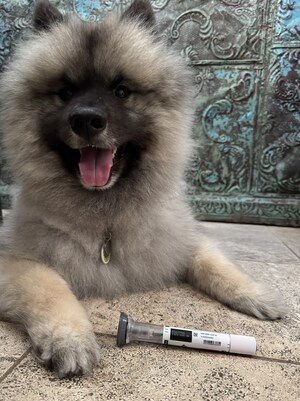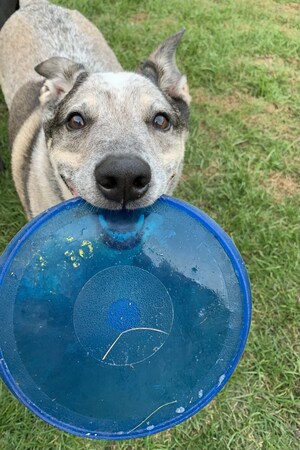MINNEAPOLIS, May 12, 2021 /PRNewswire/ -- Dogs like to explore, and sometimes that curiosity can be deadly. Recently Dodger, a 1-year-old Chihuahua mix who lives with Patricia Gutierrez and her family in Albuquerque, NM, was doing what dogs do. While searching nooks and crannies for untold canine treasures, Dodger came across a bubble package of Claritin D under the couch, a medicine used to treat the symptoms of seasonal allergies causing sneezing, runny or stuffy nose and nasal congestion. By the time Gutierrez realized what had happened, Dodger had already chewed into the packaging and ingested multiple pills.
According to Gutierrez, Dodger's reaction to the medication was quick. She noticed he was very agitated and was acting as though he was "trying to calm down from a high." She was afraid he could have had a heart attack because of the ingestion.
"At first, I wasn't that concerned because it was just Claritin D," said Patricia Gutierrez, Dodger's owner. "I wasn't going to take him in, but when I spoke to the experts at the Pet Poison Helpline, they explained that the amount of the drug Dodger had taken, because of his size, was extremely dangerous and potentially deadly. They even recommended an emergency hospital near me. I'm glad I took him in because it probably saved his life."
Dodger was taken to Route 66 Veterinary Emergency & Critical Care Center in Albuquerque, where they induced vomiting and determined that he had likely ingested 5 tablets, a life-threatening exposure. He was given a dose of activated charcoal with sorbitol, was placed on IV fluids and administered medications such as methocarbamol for tremors and phenobarbital for seizures. He was held overnight and was released the next day. According to Gutierrez, Dodger has fully recovered and is "doing really well."
"Just because a medication is safe for you doesn't mean it is safe for your pet. In fact, many common over-the-counter human medications can be deadly to pets, often because we metabolize medications very differently than they do at certain dosages," said Dr. Ahna Brutlag, a board-certified veterinary toxicologist at Pet Poison Helpline. "In Dodger's case, the most dangerous ingredient was the decongestant pseudoephedrine. This drug can cause severe cardiac and neurological stimulation and Dodger ingested 15 times the lethal dose for dogs. We were concerned about life threatening tachycardia (elevated heart rate), cardiac arrhythmias, hypertension, hyperthermia, and tremors/seizures."
Dodger came into accidental contact with a dangerous medication, but Pet Poison Helpline's toxicology experts also see many cases of unintentional poisoning caused by giving a pet the wrong medication or wrong dosage. For example, the Helpline has had several cases recently where the pet owner intentionally gave their pet Claritin D instead of regular Claritin as advised by their veterinarian, not knowing that the two medications were so drastically different. Just one Claritin D pill can be a fatal dose for many dogs or cats.
"The key takeaway regarding pets and medication is simple – keep all medications out of your pet's reach and manage your pet's prescribed medication as carefully as you would manage your own. Additionally, never give a medication to your pet without consulting your veterinarian," added Dr. Brutlag.
Pet Poison Helpline created Toxin Tails to educate the veterinary community and pet lovers on the many types of poisoning dangers facing pets, both in and out of the home. All the pets highlighted in Toxin Tails have been successfully treated for the poisoning and fully recovered.
About Pet Poison Helpline
Pet Poison Helpline, an animal poison control center based in Minneapolis, is available 24 hours, seven days a week for pet owners and veterinary professionals who require assistance treating a potentially poisoned pet. The veterinarians and board-certified toxicologists provide treatment advice for poisoning cases of all species, including dogs, cats, birds, small mammals, large animals and exotic species. As the most cost-effective option for animal poison control care, Pet Poison Helpline's fee of $65 per incident includes follow-up consultations for the duration of the poison case. Pet Poison Helpline is available in North America by calling 800-213-6680. Additional information can be found online at www.petpoisonhelpline.com.
Contact: Maja Ferrell
Pet Poison Helpline
(952) 852-4608
[email protected]
SOURCE Pet Poison Helpline

Related Links
WANT YOUR COMPANY'S NEWS FEATURED ON PRNEWSWIRE.COM?
Newsrooms &
Influencers
Digital Media
Outlets
Journalists
Opted In






Share this article